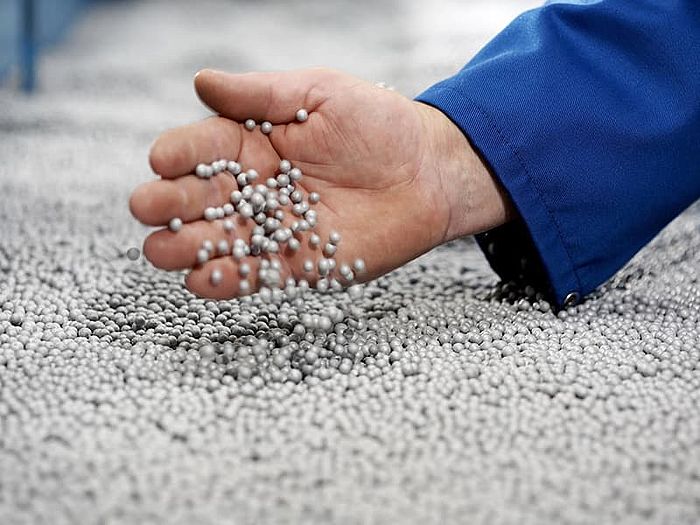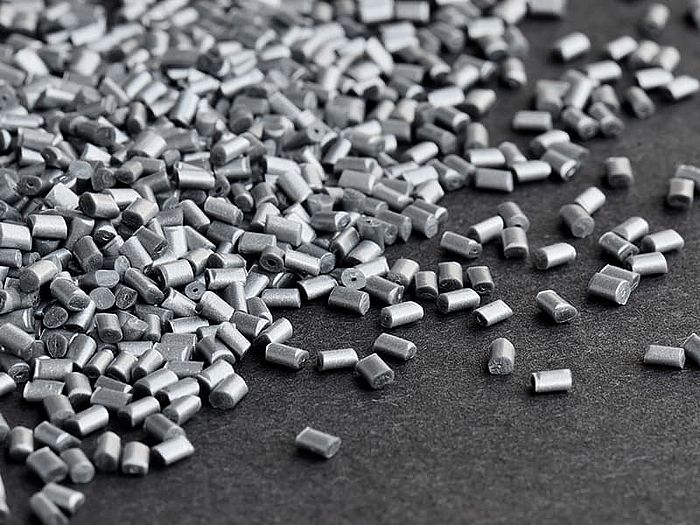Find projects
Compounding
The compounding process is what turns a plastic into an appealing formulation that can be used in a variety of ways. Due to the breadth of formulations in material development and the modularity of compounding extruders, the possibilities here are almost limitless. However, this great diversity also leads to challenges in designing the optimal processes. One focus of our activities in this area is therefore the improvement of process understanding in the continuous compounding of polymers. Building on this, we work within research projects, either independently or in cooperation with industrial partners, on new solutions aimed at optimizing the entire process chain of the compounding step and rapidly implementing them in production applications.
For this purpose, our processing pilot plant is equipped with almost all machine concepts available on the market for the compounding of plastics and offers, in cooperation with our other business units, all possibilities to work on your questions and thus also to improve your products.
Services
The activities in the area of plant optimization include the targeted further development and expansion of existing plants and plant concepts in order to obtain the optimum product in each case. To this end, we work intensively on our own ideas for optimizing existing plants, which we also implement in cooperation with the machine manufacturers if necessary. Our processing pilot plant offers a broad cross-section of almost all plant concepts available on the market, so that we can promptly test our developments and optimizations on the respective processing machines.
You would like to obtain more information about the current state of your plastic melt than is provided by integrated temperature and pressure sensors or the extruder's plant technology? SKZ offers the integration and, if necessary, individual adaptation of non-destructive inline measurement technology for the characterization of plastic melts. In this way, e.g. filler contents, viscosities and particle sizes can be determined inline, foreign materials and gel particles can be reliably detected and degrees of melting can be quantifiably characterized.
For this purpose, SKZ offers a cost-neutral assessment of your testing task and enables comparative investigations with various methods based on ultrasound, terahertz, microwaves and IR spectroscopy, among others, at your site or at the SKZ pilot plant.
Contact:
Giovanni Schober | +49 931 4104-464 | g.schober@skz.de
Accompanying the compounding tests or the material development, relevant material data, such as rheological properties by means of HKR or rheotene, can be recorded and evaluated at the SKZ. The thermal properties of the materials, such as thermal conductivities and crystallization temperatures, can be determined at SKZ, as can mechanical properties.
In most cases, even for highly innovative applications, it is not necessary to synthesize new polymers, since already known and available plastics can be sufficiently optimized, for example, by adding additives or fillers. We can support you with our know-how in the development of such tailor-made compounds. In cooperation with other research groups, SKZ is able to process innovative materials using state-of-the-art machine technology and thus create mature industrial compounds. In addition to classic thermoplastics such as polyolefins, polyvinyl chloride, polyesters, polyamides, polycarbonates or styrene copolymers and their blends, biopolymers, wood polymer composites (WPC), high-performance plastics, nanocomposites and thermoplastic elastomers (TPE) are also developed according to specific customer requirements.
We can process the entire range of materials, in addition to standard materials also materials such as PVC, WPC, TPE, elastomers, adhesives or high-performance polymers in our pilot plant. The compounding of your materials from sample quantities or smallest quantities up to batches on a ton scale can be carried out in our pilot plant. The processes and machines used for this purpose usually allow the results to be scaled up to production scale.
The team consists of experienced engineers and technicians. During an on-site consultation, we can support you in process analysis and optimization as well as record almost all process-relevant and quality-determining measured variables in consultation.
The research work in the area of process optimization aims at the continuous improvement of existing compounding processes. Despite very high technical standards in the field of compounding, optimizations of individual process parameters are nevertheless always possible. We also carry these out in cooperation with our customers to improve the products.
In addition to the optimization of existing processes, we also focus on the development of new processes, which we can realize in our processing pilot plant, partly in cooperation with machine manufacturers, on an industrial scale.
Modern compounding plants supply large quantities of process data. This data can be analyzed, interpreted and used to derive decisions that improve processes. Process models can even be used to implement dynamic data-based process control.
We help you generate added value from your data!
Contact:
Christoph Kugler | +49 931 4104-457 | c.kugler@skz.de
Today, the design of compounding processes is still mostly based on empirical knowledge. Despite all the advantages of this method, calculation methods also offer opportunities for fast and targeted design. These methods are in no way intended to replace trials and experience, but rather to make targeted use of the often scarce resources of pilot plant and production machinery by identifying the most promising trials in advance. Furthermore, production problems can be reproduced on the computer and thus, in addition to the experience gained on the machine, a view into the machine can be used to solve the problems. By means of the finite volume method, the development of procedures to determine an acceptable process and material window for the corresponding mold is investigated. On the other hand, the modeling of the plasticizing side is focused. Here, the focus is on the simulation of melt conveying in fully filled and partially filled sections, the calculation of both solids conveying and melting behavior. At SKZ, such simulation calculations can also be carried out for special extruders such as the planetary roller extruder or Kneader using specially developed programs.
As experts in the field of plastics technology, we strive to pass on the knowledge we have acquired over decades to our customers. From material development and manufacturing processes to the application of various testing and measuring methods - in our numerous practice-oriented training courses, you as a participant will acquire the necessary knowledge in dealing with plastics as a material. This begins with the selection of the right materials and compliance with production-oriented design rules, continues with the correct handling of equipment and machines for the manufacture and processing of plastic components and ends with the correct understanding of quality criteria and the associated use of testing and measuring tools.
Bringing together people from different areas of the company as well as from different industries to exchange experiences and technical know-how is also a top priority for us, in addition to the pure transfer of knowledge. Our numerous specialist events provide the ideal venue for a free exchange of ideas. Renowned speakers from a wide range of industries and excellent technical presentations make the SKZ conferences popular meeting places within the plastics industry.
State-of-the-art equipment for best results and products
A look inside our technical center. On more than 1,000 square meters, we offer you service at the highest level. Challenge us. Together we will find a solution for your problem.







Technical equipment
Plants from all well-known plant manufacturers (Leistritz, Coperion, KraussMaffei and COLLIN) are available to you in our technical center. The plant sizes range between 18 and 27 L/D diameter. This allows us to cover a throughput range from 0.2 kg/h up to 150 kg/h. Most of these systems are also suitable for compounding high-temperature thermoplastics.
The MX30 Kneader from BUSS in Pratteln/Switzerland is another option for gentle compounding at the SKZ. The throughput range of the plant is between 5 kg/h and 25 kg/h.
The mixing of different substances in a specific ratio is often used as preparation for compounding. Especially in the preparation and processing of PVC-based formulations, the production of blends, the so-called dry blends, is essential. Container and heating/cooling mixers are available at SKZ for these preparation processes. The FML10 - KM23 heating/cooling mixer from Zeppelin Reimelt in Kassel can be used to produce batches of up to 3 kg. Batches of up to 40 kg can be produced with the CM 80-H container mixer from Mixaco in Neuenrade.
Various peripheral devices are available at the SKZ for compounding tests. Our pilot plant has numerous gravimetric feeders from Brabender in Duisburg. With these we are able to realize throughputs between 150 g/h and 350 kg/h. For pelletizing, we have various plant concepts at our disposal, such as water baths or strand conveyor belts in conjunction with various pelletizers or also underwater pelletizers from Maag Automatik in Grossostheim.
The TP-WE 70/800 M2 planetary roller extruder from Entex in Bochum is particularly well suited for compounding thermally sensitive materials. The throughput range of the line is between 10 kg/h and 70 kg/h.
A test press is also available in our compounding pilot plant. Programmable heating, cooling and pressure ramps guarantee reproducible production of test specimens such as films and sheets. In addition, the lamination of a wide variety of polymer compounds with, for example, films, metals or fibrous materials is possible. For this purpose, we have a P 300 P COLLIN Lab & Pilot Solutions test press from Maitenbeth. The available pressing area of the press is 297 x 297 mm². The maximum pressing temperature here is 300 °C.
The RE3 ring extruder with 12 co-rotating screws from Extricom in Lauffen a. N. is particularly well suited for compounding highly filled materials. The throughput range of the line is between 50 kg/h and 800 kg/h.







